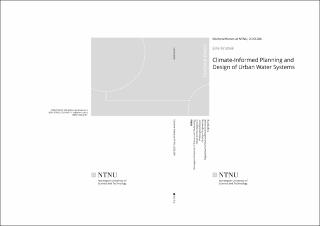| dc.contributor.advisor | Muthanna, Tone Merete | |
| dc.contributor.advisor | Alfredsen, Knut Tore | |
| dc.contributor.author | Kristvik, Erle | |
| dc.date.accessioned | 2020-09-21T11:25:54Z | |
| dc.date.available | 2020-09-21T11:25:54Z | |
| dc.date.issued | 2020 | |
| dc.identifier.isbn | 978-82-326-4921-1 | |
| dc.identifier.issn | 1503-8181 | |
| dc.identifier.uri | https://hdl.handle.net/11250/2678786 | |
| dc.description.abstract | Global warming is expected to cause alterations of the climate with potential impacts on urban water systems. As the knowledge base on climate change expands, and regional climate projections become increasingly available to local water managers, the need for climate-informed tools and decision-support systems rises.
This thesis seeks to address local stakeholders needs for novel tools and frameworks for facilitating climate adaptation and to investigate how climate projections can inform the analyses. The work of this thesis has been conducted as part of the H2020 project BINGO
- Bringing INnovation to onGOing water management - a better future under climate change (Grant Agreement number 641739), where the principal goal has been to provide end-users in the water sector with practical tools and knowledge on climate change.
The thesis specifically attends to three main applications of urban water systems: 1) drinking water availability planning, 2) storm water infrastructure design, and 3) urban drainage systems planning. To support the overall aims of the thesis, the following objectives were defined:
1. Investigate local climate projections and their potential to provide decision-support in local climate adaptation
2. Evaluate climate projections’ applicability for design in current stormwater management practice in Norway
3. Develop climate-informed adaptation frameworks for Norwegian urban water systems
To pursue these objectives, a collection of regional climate projections for the city of Bergen, Norway, was produced, processed and assessed through various tools and techniques. This resulted in a rich ensemble of climate projections for the city, covering a range of emissions scenarios, parent global climate models, and downscaling methods. These projections have further been used as input to hydrologic and hydraulic models embraced by the three defined water sector applications. Through this, the application of climate projections in planning and design of urban water systems was demonstrated and assessed, and frameworks providing decision-support were proposed.
The assessment of the resulting climate projection ensemble emphasizes the general consensus in research that ensemble approaches are necessary to gain a holistic and reliable indication of future local climates, as choices of emissions scenario, parent GCM, predictor, and downscaling techniques all introduce their own range of uncertainty. This implies that climate projections should not be further applied in a traditional predict-then-act manner, but rather treated as what they are: possible scenarios of future climate, sooner than predictions, and ensembles rather than singular best-guess estimates.
To emerge at climate-informed design practices in Norway, the results of this thesis strongly suggest that existing tools and methods should be adjusted to handle a range of input scenarios rather than single event or time series inputs. This would allow a shift from prediction-based design, to a risk-oriented design of urban water systems and system components.
Finally, three main decision-support frameworks are proposed for climate adaptation in the water sector. The three frameworks incorporate a new dimension of climate change information into traditional tools known to the water sector. In addition to addressing the third, and last objective of this thesis, they also contribute to the principle goal of the BINGO project: to provide end-users in the water sector with practical tools and knowledge on climate change. Although the results are site specific, linking frameworks to existing tools ensures scalability and transferability of methodologies. | en_US |
| dc.language.iso | eng | en_US |
| dc.publisher | NTNU | en_US |
| dc.relation.ispartofseries | Doctoral theses at NTNU;2020:286 | |
| dc.relation.haspart | Paper 1: Kristvik, Erle; Muthanna, Tone Merete; Alfredsen, Knut. Assessment of future water availability under climate change, considering scenarios for population growth and ageing infrastructure. Journal of Water and Climate Change 2019 ;Volum 10.(1) s. 1-12
https://doi.org/10.2166/wcc.2018.096
OA copyright CC BY 4.0. | en_US |
| dc.relation.haspart | Paper 2: Kristvik, Erle; Kleiven, Guro Heimstad; Lohne, Jardar; Muthanna, Tone Merete. Assessing the robustness of raingardens under climate change using SDSM and temporal downscaling. Water Science and Technology 2018 ;Volum 77.(6) s. 1640-1650
https://doi.org/10.2166/wst.2018.043
OA copyright CC BY 4.0. | en_US |
| dc.relation.haspart | Paper 3: Kristvik, Erle; Johannessen, Birgitte Gisvold; Muthanna, Tone Merete. Temporal downscaling of IDF curves applied to future performance of local stormwater measures. Sustainability 2019 ;Volum 11.(5)
https://doi.org/10.3390/su11051231
OA copyright CC BY 4.0. | en_US |
| dc.relation.haspart | Paper 4: Long term simulations of combined sewer overflows for climate adaptation planning Kristvik, E., Gragne, A. S., Muthanna, T. M., and Alfredsen, K. | en_US |
| dc.relation.haspart | Paper 5: Cost-effective solutions for climate adaptation of urban drainage systems Strehl, C., Kristvik, E., Koti, J., and Muthanna, T. | en_US |
| dc.title | Climate-Informed Planning and Design of Urban Water Systems | en_US |
| dc.type | Doctoral thesis | en_US |
| dc.subject.nsi | VDP::Technology: 500::Environmental engineering: 610 | en_US |

